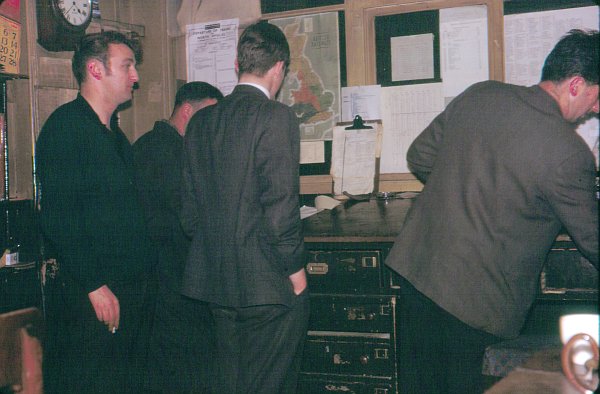North Shields Station
My Old Note Books: Cosmopolitan North Shields

A Shields Weekly News article [unfortunately not dated] spoke of "distinct ethnic areas": (quoting "an old Shields resident") "Germans and Norwegians in Bell Street; Greeks and Spaniards in Clive Street; and Lascars [Indian or Arab sailors] at the Bull Ring". There were many boarding houses for particular nationalities run by their fellow countrymen who had sometimes married local girls.
A 'Coloured National Mutual Association' was formed in 1930 to protect the interests of 'coloured' residents of the town - which suggests there were quite a few of them, especially as the association seems to have split into two groups in 1939. There was a 'coloured' seamen's hostel known as Colonial House at 3 Northumberland Place.
A Jamaican called Ann Preston was living in Preston Village in the 1820s, and an escaped American slave, Mary Ann Macham, was in service in Dockwray Square in the 1830s and later married a North Shields bank porter and survived until at least 1890.
There seem to have been a number of German and Norwegian owned shops in the town from at least the 1880s (and almost certainly much earlier). Norwegian names appear so regularly in the local papers that they elicit no particular comment. As I mentioned earlier the Norwegian community in Shields was substantial enough to open its own church in Borough Road in 1868. It was extended as 'recently' as 1953.
There were two Greek-owned ship chandlers shops in Clive Street until the 1950s, and "the small Greek colony in North Shields" was reported in 1940 as being "very optimistic regarding the Italian attack on their country". A Mr E. Defteros - a cobbler of William Street - said: "Italians are not good fighters but they are good gangsters". An Italian owned business in the town had the distinction of being demolished by a run-away tram in 1919.
There was a Jewish community in North Shields with a burial ground in Hawkey's Lane as early as the first decade of the nineteenth century. The ground was cleared in 1924 and the remains reinterred in a special Jewish section of Preston Cemetery. They bought a house in Linskill Street in 1870 which was consecrated as a synagogue in 1876. By 1880 this had become too small for the 20 or so families attending and needed to be enlarged. More Jewish families settled in the town in the 1930s as a result of Nazi persecution, but by 1965 the majority had moved on and the synagogue was closed.
Gannin shoppin in Shields

Newcastle in film: Stormy Monday
The sundered town beside the sea
Inhabitants of North and South Shields each call their town 'Shields', as do the local newspapers the (South) Shields Gazette and the (North) Shields Weekly News. Growing up in North Shields I thought of South Shields as somewhere distant and strange. It certainly never occurred to me that the two Shields might be parts of a single divided town. In my twenties I was a regular visitor to Berlin and became fascinated with the divided city which, during the Cold War, we thought of as the place 'nearest the realities of the age'. Did my interest have its roots in the unrecognized division of my own childhood home?
In his poem 'The town where I was born' James Kirkup (born in South Shields) describes his '"almost daily journeys" on the Market Place Ferry as "an enchanted voyage . . . loaded with lust and library books". But he also suggests that the division of the town in some way explained and reflected his own sexual ambiguity and sense of alienation.
And now I see it was from that divided town, that Scylla
and Charybdis my lightning-struck divisions came -
the ambiguities of being, thought and action.
It tugged my heart, my loyalties, my dreams, my passions
in opposite directions - made me love and hate
the sundered town beside the sea, beneath colossal skies,
made me cherish and abhor my roots, my origins
my faults, my gifts, and even life itself. I became that ferry
on the great river rising to a sea of doubt and death."
Ferry cross the Tyne

James Kirkup on returning to South Shields in Sorrows, Passions and Arrows (1959).
Z-Car Number Galaxy

Broken shops: The Old Foxhunters

































